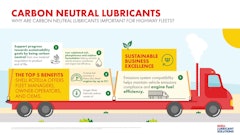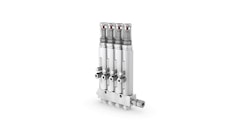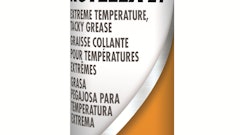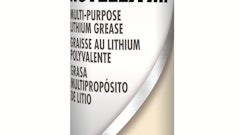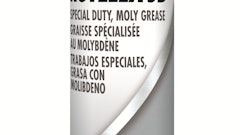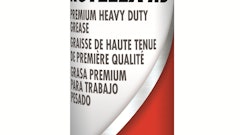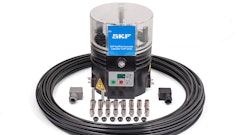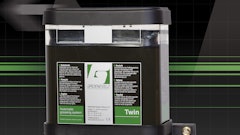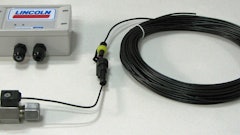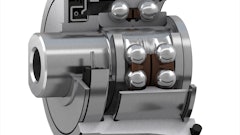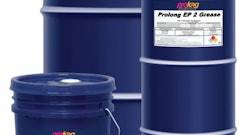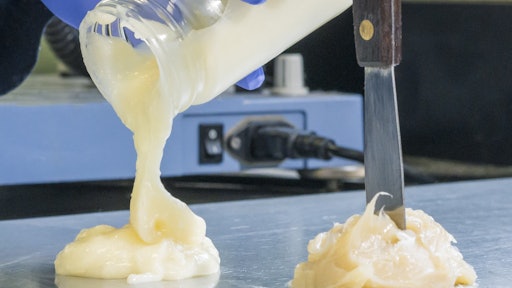
The industrial grease market is facing an increasingly urgent challenge. Lithium soaps — a reliable, consistent and cost-effective thickening agent used by the industry for decades — have become increasingly costly and unavailable.
There are a few contributing forces to the lithium supply crisis. First, the North American volume and market share of both conventional and complex lithium greases have fallen in recent years, compounded by the closure of a major grease-producing facility in 2021 that significantly impacted supplied volumes. Secondly, production has failed to meet demand, lithium has become increasingly scarce for grease applications, as lithium producers have shifted their focus to the exponentially growing market for battery applications in electric vehicles. This shift has driven unsustainable price volatility for lubricating grease applications.
Finally, potential changes in classification and labelling pose an even greater threat. In 2021, the European Chemicals Agency published an opinion that lithium hydroxide was identified as a potential reproductive and lactation hazard. While a final classification will not be known until an ultimate ruling is made, if lithium hydroxide is classified as a reproductive toxic and a substance of very high concern, it could have significant impact on the way lithium-containing greases are labeled and used. For the global off-highway equipment industry, OEMs would likely need to carefully consider their specified lubricating greases throughout Europe.
A reliable alternative is a necessity moving forward. The good news is that moving away from lithium may enable grease manufacturers to improve performance across a range of critical applications, and a number of candidates have demonstrated significant potential.
 There are several good candidates that have the potential to replace lithium on a broad scale for high-performance industrial grease manufacturing.Lubrizol
There are several good candidates that have the potential to replace lithium on a broad scale for high-performance industrial grease manufacturing.Lubrizol
Evaluating Potential Lithium Alternatives
With challenge comes opportunity and innovation. It is critical to develop alternative thickeners that offer reliable supply, favorable compliance, and most importantly, no sacrifice in performance. Critical off-highway applications — including stationary and mobile hydraulic equipment, industrial machinery and more — depend on it.
With all of this in mind, it’s worth digging into some of the potential alternatives currently being tested and evaluated.
Anhydrous Calcium Soaps
Anhydrous calcium soaps have been identified as a potential lithium alternative, but extensive testing has exposed a few weak spots. The biggest challenge has been their inferior thermal stability compared to lithium greases, which can lead the thickener to irreversibly separate from the grease — an unacceptable failure mode for industrial applications.
But there is potential here. To combat this issue, research has shown that adding a thermal stabilizer will help elevate a grease thickened with anhydrous calcium soaps to an acceptable upper operating temperature of 120 degrees Celcius required for commodity lithium greases.
Calcium Sulfonates
Calcium sulfonates are the fastest-growing thickener type in Europe; their volume has more than doubled over the past decade. Overall, calcium sulfonates can be used to replace the lithium complex thickener and provide greases that meet industry requirements — and they’re already being used to do so.
There’s good reason for this. Calcium sulfonate-thickened greases maintain excellent antiwear, corrosion, and thermal resistance properties, even without additives. Synthetic sulfonates also have demonstrated excellent water resistance.
But there are drawbacks as well. Calcium sulfonate greases must include significantly more thickener content compared to lithium, which can result in poor low temperature performance, pumpability issues and limited performance in some applications.
Hybrid Calcium Thickeners
Given some of the deficiencies of anhydrous calcium greases and calcium sulfonates, work is being done to develop new hybrid calcium greases that can overcome those limitations.
Lubrizol has performed pilot work on these formulations, and the results have been promising. These greases are cost-comparable to conventional lithium greases and can fulfill the basic performance requirements of the National Lubricating Grease Institute’s (NLGI) new high-performance multipurpose (HPM) grease certification for North American lubricating greases. Further work is required before such greases will be widely available, but the potential is significant.
Urea Derivatives
Urea derivatives have also demonstrated good potential as lithium alternatives. In most bearing applications, for example, Lubrizol has documented that greases thickened with urea derivatives outperform lithium and lithium complex greases across a range of critical performance criteria and give longer lives in rolling element bearing applications. Additionally, new urea derivative concentrates are available that offer new efficiencies in manufacturing for grease marketers.
But there are some significant challenges. Isocyanates and amines used in urea derivative production are hazardous and are strictly controlled in some global regions like Europe; indeed, a limited number of thickeners are Registration, Evaluation, Authorization and Restriction of Chemicals (REACH) registered.
Availability may also be limited. Manufacturing in Europe is currently at 80% capacity, and the costs of building new facilities are a significant roadblock.
Concentrated diurea greases have shown potential as a novel thickening chemistry for grease manufacturers, which in their pourable liquid form can produce NLGI consistency grades from 0 to 3. Manufacturers are then able to finish this concentrate to the desired consistency and include performance additives that help them differentiate its formulation. They also perform very well in multipurpose greases commonly used in automotive applications, as well as severe industrial applications like in steel foundries where extreme heat is constant. They are also ideal for sophisticated applications involving high speeds and requirements for lower vibration and noise.
One of the biggest advantages of these greases is in their rheology. Such formulations can change their consistency to best serve the shear stress faced in the application. These greases also maintain optimal pumpability for centralized grease distribution systems, helping to contribute to lower total cost of ownership due to their field trial performance in reducing consumption.
Looking Ahead
There are several good candidates that have the potential to replace lithium on a broad scale for high-performance industrial grease manufacturing. Calcium greases — including those thickened with anhydrous calcium, calcium sulfonates, and hybrid calciums — have shown good potential in a wide range of applications. Meanwhile, urea-thickened greases have been shown to outperform lithium greases in many applications.
The path forward may not be immediately clear, but formulators have options — and they may help elevate the performance of industrial greases on a broad scale. By replacing lithium thickeners with alternative compounds, a new generation of greases can provide excellent compatibility, high-temperature stability, water resistance, and extended equipment life. Such progress is not only important to replace lithium thickeners. OEMs continue to develop new, higher-performing, and more efficient machinery, and industrial greases must maintain their pace for all applications to meet their full potential.
At Lubrizol, we are applying all our resources to help our customers in this space, navigate these changes and provide continuous support for grease manufacturers with high-performance alternatives to lithium greases. We believe that by working together to explore and think differently, we can transform necessary change into true advancement.



